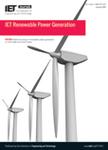版权所有:内蒙古大学图书馆 技术提供:维普资讯• 智图
内蒙古自治区呼和浩特市赛罕区大学西街235号 邮编: 010021

作者机构:Univ Leeds Sch Elect & Elect Engn Leeds W Yorkshire England Cent South Univ Sch Traff & Transportat Engn Changsha Peoples R China
出 版 物:《IET RENEWABLE POWER GENERATION》 (IET. Renew. Power Gener.)
年 卷 期:2020年第14卷第18期
页 面:3668-3678页
核心收录:
学科分类:0820[工学-石油与天然气工程] 0808[工学-电气工程] 08[工学]
基 金:EPSRC [EP/L001063/1] Funding Source: UKRI
主 题:genetic algorithms power supply quality traction power supplies railway electrification regenerative braking optimal control railway co-phase traction power supply renewable energy NSGA-II hybrid power quality conditioner single-phase traction loads complex system power unbalance multiobjective optimisation problem sorting genetic algorithm-II renewable power hybrid optimal compensation control regenerative braking optimal compensation scheme HPQC capacity power quality requirement carbon emission variable traction loads
摘 要:In railway traction power supply, co-phase system with hybrid power quality conditioner (HPQC) is capable of tackling the power quality issues caused by single-phase traction loads. To further reduce the overall carbon emissions in railway systems, this paper considers to integrate the renewable energy with railway power supply, which however leads to a more complicated system to model, design and control. This paper first investigates its modelling aspect. To reduce the operating capacity of HPQC while addressing the power unbalance, optimal design of the compensation scheme for co-phase system is formulated as a multi-objective optimization problem which is then solved by the nondominated sorting genetic algorithm-II (NSGA-II). To eliminate the impact of errors arising from imperfect predictions of the loads and renewable power, a hybrid optimal compensation control is proposed, yielding full and optimal compensations. Comprehensive simulation studies, considering three operation modes covering variable traction loads, renewable and regenerative braking power, are conducted. The simulation results confirm the validity of the proposed optimal compensation scheme, achieving an average of more than 20% reduction in HPQC capacity compared to the full compensation scheme. Meanwhile, the power quality requirement is satisfied, even in the presence of real-time prediction errors.